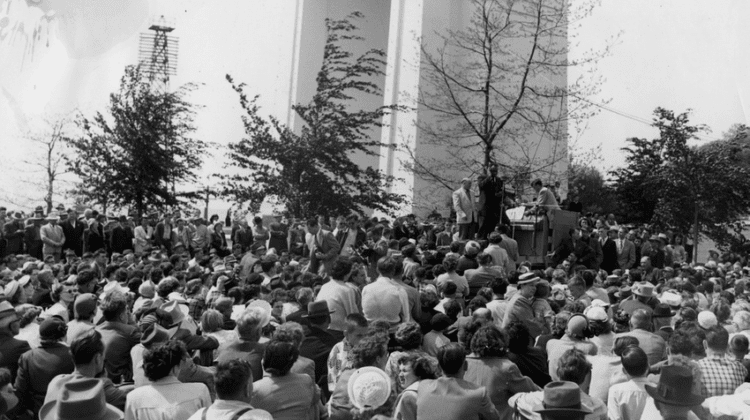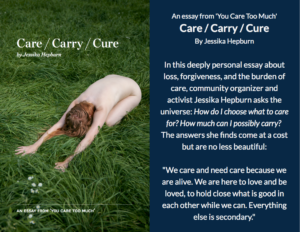
This is a story about distance, that is a story of resistance, as most stories worth telling are. It is both a warning and reminder that words have power to unite or divide, heal or harm. Take for example the distance between Black Lives Matter and All Lives Matter. Whole lifetimes and generations of meaning exist between these six words. Words that wound, hold histories spanning continents, legacies of hurt and violence, unimaginable distance, such rage and grief. A global pandemic has shown us how badly people need community care and each other, it has also shown us how incapable our systems and governments are of providing that care. The people united can never be defeated but we are so easily divided with words. Words that become policy, foundations for racist systems, justify violent actions, keep us from each other and the comfort of community. We can look to the past and poetry for stories to help understand the present and imagine new futures.
Have you ever heard of Paul Robeson? Paul was a legendary Black American singer, activist, actor and lawyer who dared to be for the people. Pro-union, anti-fascist, anti-colonialist, outspoken against the KKK during the McCarthy era, governments on both sides of the border wanted to silence him. The Mayor of Toronto even forbid him from speaking during a 1947 concert, Robeson was however permitted to sing. And could he ever sing! Prevented from speaking Robeson would change lyrics and transform sorrowful spirituals into triumphant calls to unity for all the “oppressed and exploited people of the earth”.
In her famous poem ‘Paul Robeson’ Pulitzer Prize winner and revolutionary Black poet Gwendolyn Brooks described hearing that voice:
That time
we all heard it,
cool and clear,
cutting across the hot grit of the day.
The major Voice.
The adult Voice
forgoing Rolling River,
forgoing tearful tale of bale and barge
and other symptoms of an old despond.
In 1952 Robeson had been scheduled to speak at the Vancouver Mine-Mill union convention in 1952. Mine-Mill was one of the most progressive, democratic unions in Canada at the time, the same union that Vancouver labour legend Ginger Goodwin belonged to. Robeson never even made it to the border, his train was boarded and passport revoked by his own country. Canada had no plans on letting him in anyway, the St. Laurent government and mounties had been keeping tabs on his growing popularity, radical politics, and attendance at peace and labour movement rallies across Canada since at least 1940 with the goal of preventing his words from influencing Canadians. Paul Robeson’s concerts had drawn severe violence for his condemnation of the Ku Klux Klan. During the racist Peekskill Riots in New York an effigy of Robeson was lynched and the mostly Black and Jewish concertgoers attacked by hundreds of white supremacists.
Robeson sang to the Mine-Mill convention in February anyway, despite the ban. His voice piped in through the telephone and amplified to a crowd of 2000 miners. The “illegal” concert was widely reported on and a larger one was organized by the union at the Peace Arch border crossing between Washington and British Columbia. On May 18th 1952 Robeson’s voice rang out from the back of a flat bed truck in defiance of governments, police, and secret services of both countries. The event drew massive crowds of up to 40,000 people, mostly Canadians, and was repeated 4 times until Robeson’s passport was finally returned. People can only take so much abuse, after years of speaking out, Paul Robeson died in seclusion struggling with mental illness when he was just 77. Speaking and singing for the people is often fatal. Remember Billie Holiday, another Major Voice, dying chained to a hospital bed criminalized for her humanity and addiction. Gil Scott Heron. Nina Simone. Some lives and histories have always been more equal than others.
Sixty-eight years and 7 days after Paul Robeson’s first Peace Arch concert, on May 25, 2020 George Floyd’s voice would call out as he was murdered by police in Minneapolis and the world watched. George cried for his mama, for breath, for life, for dignity, for decency, and people are rising yet again in response. Here in Canada we are reckoning with a foundation of racist colonial violence against Indigenous and Black people. The scars of that history and the weight of the words cut so deeply, the distance between us becomes a vast rolling river. In that river are so many lives.
Lives like 21 year old Frank Bell, a Kwak^Wala youth from Alert Bay, who was murdered by Vancouver police when they saw his Walkman as a weapon in 1992. I was 9 years old and my mom had spent the night before at the drop-in centre where she worked talking to Frank about his plans to go back to his community for healing. Instead of healing Frank was killed by police who faced no consequences and his community mourned. Times have not changed enough when beloved lives like Chantel Moore and Rodney Levi and Regis Porchinski-Paquet were all recently taken by police during wellness checks.
Right now, as I write this, police, RCMP, and military are hunting a Mi’kmaw man through communities and backyards in rural South Shore Nova Scotia with military weapons and helicopters. Swat teams on the street for a lone barefoot man. Still raw from 22 deaths in the largest mass shooting in Canada’s history and a police lockdown on top of a public health crisis, now another domestic assault has escalated to a multi-day manhunt. Some of my neighbours want this young man dead, people are publicly wishing harm on his victimized girlfriend and child, spewing racist garbage about him and Indigenous communities. Hurt upon hurt. Words and wounds. The long river of history keeps rolling on, taking all of us with it.
Here we are at the end of our story, standing at the militarized border wall separating Black Lives Matter and All Lives Matter. In the crowd are all the people whose lives are threatened by the white world as it is — Black folks, Indigenous communities, people of colour, Muslims, Palestinians, Jews, Queer communities, immigrants and refugees, people with disabilities, the poor, children, youth, seniors, prisoners, the ill, everyone needing care. Together we can gather each other up safe, make a world of words for everyone who has ever been made less or other, everyone in need of the warmth of community. There are so many of us. The words we need are already ours. They are Audre Lorde telling us that “without community there is no liberation”, Paul Robeson refusing to move backward “not one-thousandth part of one little inch”, or Gwendolyn Brooks remembering that voice:
Warning, in music-words
devout and large,
that we are each other’s
harvest:
we are each other’s
business:
we are each other’s
magnitude and bond.
We are each other’s magnitude and bond.
Sources and Further Reading:
Originally written for With/Out Pretend virtual storytelling event 2020

